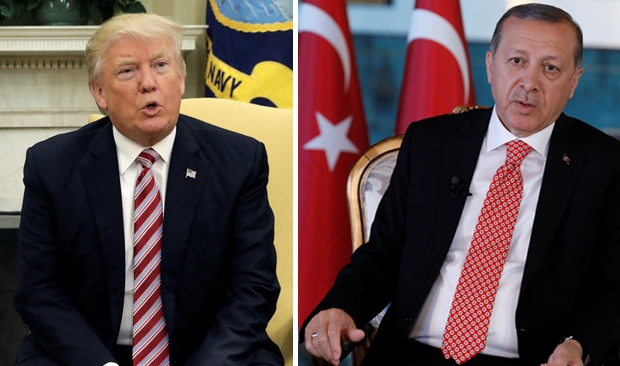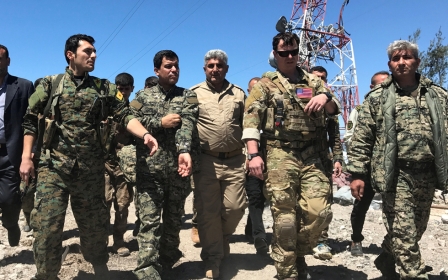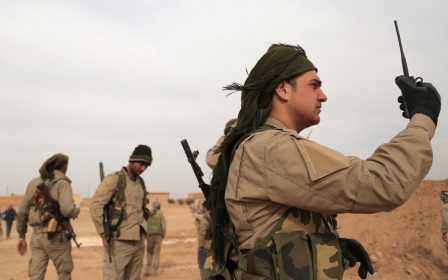'Fresh page' for US-Turkey relations? Slim chance

President Recep Tayyip Erdogan of Turkey is due to meet US President Donald Trump in the White House next week, the first meeting between the two men.
But with seven days still to go, the US announced on Tuesday this week that Trump has authorised plans for the US military to arm the Syria Kurdish militants, the Peoples Protection Units (YPG) directly.
Turkey’s original aim in Syria a few years ago was regime change. Any chance of being able to do that is now gone thanks to Russian intervention
It is difficult to imagine any single action by the US that could do more damage to American-Turkish relations. Turkey’s original strategic aim in Syria a few years ago was regime change. In other words, creating a predominantly Sunni Muslim state to replace the government of Bashar al-Assad.
Any chance of being able to do that is now gone thanks to Russian intervention. Instead, Ankara is focused on something much more limited: trying to thwart the Syrian Kurdish enclaves in northern Syria from turning into permanent autonomous zones which could be the precursor to an independent Kurdish state.
At an enormous cost, southeastern Turkey has been pacified, though violence still continues there.
If there is an autonomous Kurdish state on the other side of Turkey’s long southern border with Syria, Turkey’s Kurds are much less likely to accept their new situation forever, and this is something that almost all Turks see as a threat to their country’s territorial integrity.
Little chance of turning back
Aware of Turkish reaction, the Pentagon tried to reassure opinion in Ankara. "We are keenly aware of the security concerns of our coalition partner Turkey," said Dana White, the department of defense spokesperson. "We want to reassure the people and government of Turkey that the US is committed to preventing additional security risks and protecting our NATO ally."
If the US discards its Kurdish allies, Erdogan has said Turkey could work with the US instead to capture Raqqa. This is not a realistic alternative
These words were not enough to cut any ice with the Turks. Nurettin Canikli, deputy prime minister, immediately declared that arming the Syrian Kurds was completely unacceptable. “We cannot accept the presence of terrorist organizations that would threaten the future of the Turkish state. We hope the US administration will put a stop to this wrong and turn back from it.”
A few hours later, Turkey’s prime minister, Binali Yildirim, called on the United States to reverse its decision.
Though President Erdogan has repeatedly said that if the US discards its Kurdish allies, Turkey could work with the US instead to capture Raqqa, this is not a realistic alternative. Turkish troops would first have to fight their way through Kurdish-held territory and their effectiveness is not likely to be as great as the well-armed and combat-hardened Syrian Kurds.
One-sided partnership
So there could hardly be a worse backdrop to the Erdogan-Trump meeting scheduled for next week during the Nato summit in Washington.
Turkish diplomacy seems unable to pull the right levers to obtain what it wants
President Erdogan had laid enormous stress on this visit, indicating that despite the growing anti-Western rhetoric in Turkey’s public life, the US is still seen as a vital strategic and political partner. But quick to resort to threats, Turkish diplomacy seems unable to pull the right levers to obtain what it wants.
Alternatively, as some US observers say privately, Ankara’s ideas of the partnership are one-sided. Other than the facilities at Incirlik Airport, Turkey offers little strategic assistance and often does not keep its allies in the coalition against IS properly abreast of what it is doing. It is this lack of close cooperation that has, as it were, driven the US military into the arms of the Syrian Kurds.
►READ MORE: He's arming the YPG. Now Trump should tell Erdogan to restart PKK peace talks
To prepare for the summit, and ensure that senior echelons of US administrators were briefed about what Turkey wanted, three of Turkey’s most senior figures – General Hulusi Akar, the chief of the Turkish General Staff, Hakan Fidan, the head of MIT, Turkey’s intelligence services, and Ibrahim Kalin, the president’s top adviser, went to the US on 6 May.
Erdogan's wish list
If as seems likely, they have not made much headway, and especially in the light of the decision to support the YPG with weapons, tempers may by now be wearing a little thin. Nonetheless there are other things Erdogan can hope for from the visit.
One is the possibility that the US will support efforts to work with Russia to create de-escalation zones in Syria, which serve Turkish, rather than Syrian Kurdish interests, and do not mean that any kind of Turkish incursion into the enclaves would meet an immediate American and Russian response.
Though such a military operation would be immensely hazardous, President Erdogan still hints that he would like to order one. Talking to the press recently, he warned the Syrian Kurds that "We may turn up suddenly one night."There are also two other matters which Erdogan will want to discuss directly with Trump. One is the possible extradition of Fethullah Gulen, the exiled leader of the Islamic Gulenist movement, for his alleged part in masterminding the attempted coup in Turkey last summer. Trump is thought to be slightly more favourably disposed to such a move than the previous US administration was, but so far there has been no perceptible progress.
►READ MORE: 'De-escalation' in Syria: Another doomed ceasefire attempt
Erdogan would also like to see the US drop charges against Reza Zarrab, a Turkish-Iranian businessman, who has been held in a US jail for over a year and is due to go on trial in August on charges of sanctions-busting. The deputy head of one of Turkey’s large banks will stand trial with him. In this case, there could conceivably be movement.
Trump fired the prosecutor in the case a month ago and Rudy Giuliani, the former mayor of New York and a Trump ally and even a possible candidate as next head of the FBI, is part of Zarrab’s defence team and has visited Ankara to discuss the case with Erdogan. But the release of Zarrab might be politically damaging for Trump.
So the Trump-Erdogan meeting will go ahead. But even if the two leaders manage to emerge from it smiling, it looks as if US-Turkey relations have run into the sand.
- David Barchard has worked in Turkey as a journalist, consultant, and university teacher. He writes regularly on Turkish society, politics, and history, and is currently finishing a book on the Ottoman Empire in the 19th century.
The views expressed in this article belong to the author and do not necessarily reflect the editorial policy of Middle East Eye.
Photo: Reuters
Middle East Eye propose une couverture et une analyse indépendantes et incomparables du Moyen-Orient, de l’Afrique du Nord et d’autres régions du monde. Pour en savoir plus sur la reprise de ce contenu et les frais qui s’appliquent, veuillez remplir ce formulaire [en anglais]. Pour en savoir plus sur MEE, cliquez ici [en anglais].








